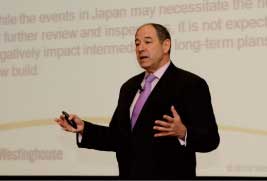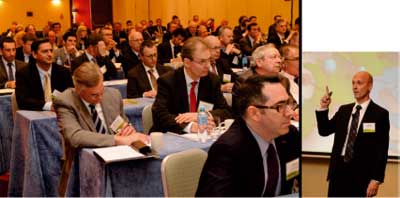
Preparedness and a collaborative approach work best for meeting global customers’ growing energy needs
On 12 and 13 April, the first-ever Westinghouse Europe, Middle East, and Africa (EMEA) Supplier Summit took place in Warsaw, Poland. The objective of the two-day summit, which developed the theme: “Getting Onboard, Getting Started, Getting Better,” was to help expand the company’s supply chain, and reinforce both its new regional model and long-standing “buy where we build” commitment. Representatives from more than 100 nuclear supply companies, from more than 17 countries, travelled from across the EMEA region to attend the summit.
This agenda focused on communicating the following:
-
Westinghouse’s organisational changes following the switch to a regional model and, in particular, how the structure under the new model affects suppliers
-
Its expectations for continuous improvement
-
Supplier requirements
Speakers during the event also stressed the importance of both engaging new companies in the EMEA supply base and strengthening relationships with existing suppliers as nuclear growth is expected to continue.
Westinghouse’s Senior Vice President of Operations Support, Dan Lipman, set the scene with a look at the status of the global nuclear industry in the aftermath of the tragic events at Fukushima. He expressed the view that while there are likely to be some delays in new plant projects, “the overall momentum remains in favor of nuclear playing a growing role in the world’s energy production,” with a continued shift toward passive safety designs such as the Westinghouse AP1000® nuclear power plant, and the benefits which that approach can offer. The passive features of the AP1000 design, which rely on the forces of nature and simplicity to enhance plant safety and operations, were explained in more detail in a later presentation by Miguel Palazuelos, a Project Manager from Westinghouse’s organisation in Madrid, Spain.

Westinghouse Senior Vice President of Operations Support Dan
Lipman projects nuclear growth despite events in Japan.
Details of projected growth in the nuclear business were expanded upon by Anders Jackson, Westinghouse’s President of the EMEA Region, and by Rita Bowser, Vice President of Major Projects for the EMEA Region. Mr. Jackson captured the attention of the suppliers’ delegates when he stated: “The aim is to double the scale of Westinghouse’s business in the EMEA region within five years, with the new plants and reactor services sectors being those where greatest growth can be expected.” He backed this up with a look at the new plant market where at least 60 GW of additional capacity is being discussed. He went on to say that: “Even if only a third of those projects were to come to fruition with a Westinghouse success rate of 50 percent, an attractive prospect of two AP1000 units per year would still result." And this would indeed be an attractive prospect for qualified suppliers as well.
Ms. Bowser outlined yet more substantial projects currently on the radar, such as reactor vessel head replacements, in addition to new plant market opportunities in the U.K., for which Westinghouse currently maintains approximately 600 qualified British supplier registrants in its supplier database.

Supplier delegates listen as Anders Jackson, Westinghouse
president of the EMEA region, describes projected growth of nuclear
new build in the region they serve.
Mr. Jackson then remarked: “I am delighted that we are hosting this event here in Warsaw to bring together current and potential suppliers from across the EMEA region. Europe alone now accounts for 30 percent of Westinghouse’s global turnover, and a similar proportion of our global workforce is based here.”
He added: “We have a policy to ‘buy where we build’ as far as possible – which means using local suppliers, rather than one single supply chain for projects across the world. But clearly those local suppliers must still be able to meet our quality requirements and to offer competitive pricing. Our aim through this event is to help as many suppliers in this region to make the grade.”
To assist suppliers in understanding the most effective approach for working with Westinghouse and “making the grade,” Juan Molina, Vice President and Chief Procurement Officer of Supply Chain Management, presented the specifics of the supply chain and procurement process and prompted a discussion on Westinghouse’s global supply chain management strategy. Mr. Molina outlined the need for suppliers to embrace the opportunities available and to develop a growing sense of urgency – things which he said Westinghouse has also been doing. He stressed that early and effective collaboration is the best method to ensure readiness to meet stringent nuclear market requirements.
Other sessions during the summit provided an update on Westinghouse AP1000 construction projects in the U.S. and China, explained the approach Westinghouse adopts there, and outlined the company’s expectations with regards to safety, quality, technical excellence, as well as human and environmental performance. How these weigh in with each supplier’s financial stability, his continuous improvement initiatives and organisational culture were also analysed. Additional information about the support Westinghouse can offer to companies looking to enter its supply chain for the first time was relayed to participants and an explanation of “who is who” in the company’s supply chain functions was given. A particular focus throughout the event was how Westinghouse and its supply base can collaborate to provide efficient operations for global customers.
In a change of pace, delegates and Westinghouse hosts also heard from Teresa Kaminska, President of the Pomeranian Special Economic Zone Region in the north of Poland. Pomerania contains the Gdansk shipyards and the neighbouring city of Gdynia, which form the connection between Pomerania and Westinghouse’s European supply chain. The modular approach adopted in the construction of the AP1000 plant lends itself to having the modules fabricated in shipyards or other similar facilities, and Westinghouse is investigating the potential of working with the Pomeranian Special Economic Zone to establish a major manufacturing and assembly center there. It was certainly clear from Kaminska’s speech that the establishment of a module fabrication facility in the region would be welcome. She also made clear that both she and the region are very supportive of the nuclear industry, and will work hard to make sure that Pomeranian businesses can play a major role in the future of the industry.
Closing the Summit, Mr. Molina urged suppliers not to underestimate the scale of the opportunity presented by the projected growth of Westinghouse’s nuclear business in the EMEA region, and stressed that Westinghouse is prepared to help suppliers become qualified to the appropriate levels. He also emphasised that the supply chain is a two-way street, and it is expected that suppliers looking to make the grade will also invest in achieving that goal. He stated that reasons to do so include the need to demonstrate and instill the necessary commitment to achieving success within their own organisations. Finally, Mr. Molina reminded the audience of an old Chinese proverb that says: “Opportunities always look bigger when they are going than they did when they were coming.”
The delegates at this event certainly left knowing that the opportunities available to Westinghouse’s supply chain partners in the EMEA region are very substantial and their remarks and feedback reflected the energy and enthusiasm felt on all sides.
Larisa Dubská, Director of Marketing and External Affairs at Envinet a.s., located in Modřínová, Czech Republic, stated that: ”The summit was a tremendous success, providing the right mix of knowledge and networking opportunities. It was my pleasure and privilege to exchange views with other participants and make new contacts.” She added: “I am looking forward to our fruitful and mutually beneficial cooperation on the territory of the Czech Republic and abroad in the fields of radiation monitoring, radwaste characterization, free release measurement, laboratory technology, etc.”
Jean-Jacques Laurent, of the company André Laurent, located in La Ricamarie, France, said that thanks to the event his company: “..could understand better the performance of the AP1000, the full Westinghouse strategy, and the Westinghouse requirements from partners-suppliers.” He added: “I hope that we can be a strong partner-supplier in the near future by responding to each of your requirements.”
By Adrian Bull, Westinghouse EMEA Region Media
& Stakeholder Relations
[Footnote:
Ahead of the EMEA Supplier Summit, delegates had the opportunity to attend an exclusive, high-profile panel discussion entitled: Innovation and international industrial cooperation: Nuclear power as a response to the carbon emission challenge. This event was co-hosted by Westinghouse and the Warsaw University of Technology, and attracted considerable media interest. The participants in the panel were the U.S. Ambassador to Poland, Lee Feinstein, the Polish Government’s Commissioner for Nuclear Energy, Hanna Trojanowska and the Director of the Polish National Centre for Research and Development, Professor Krzysztof Kurzydlowsky]
|

